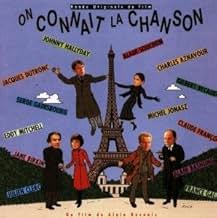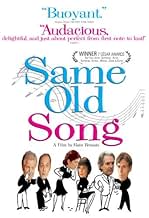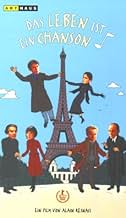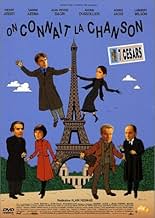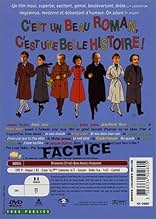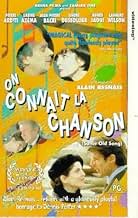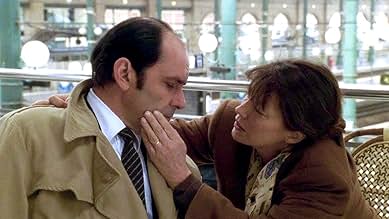On connaît la chanson
IMDb RATING
7.3/10
4.6K
YOUR RATING
A musical story about how people find their love on the streets of beautiful Paris.A musical story about how people find their love on the streets of beautiful Paris.A musical story about how people find their love on the streets of beautiful Paris.
- Director
- Writers
- Stars
- Awards
- 10 wins & 9 nominations total
- Director
- Writers
- All cast & crew
- Production, box office & more at IMDbPro
Featured reviews
Alain Resnais was at the age of 76 when he made his first musical, and to be honest he might just be the last filmmaker I would've guessed to make a musical - even that music has always played a huge part in his films. Alain Resnais was one of the most essential auteurs of the French new wave in early 1960's, during which he got a reputation as an experimental filmmaker by making Hiroshima mon amour (1959) and Last Year at Marienbad (1961) - who would've thought that a man who made these tragic, ambiguous films was going to make a musical? To my mind, through Same Old Song (1997) Resnais achieved the same Hitchcock did; combining experimentalism and populism - the film was drowned by Cesar awards.
In my opinion Same Old Song is the best musical made after the 1960's. Just like western and film-noir so has this genre died. But luckily someone was still able to bring something new to it. Same Old Song is and is not a musical. In the genre wishful thinking, better and dreamed ego, hopes for a better world and existence are combined. From this perspective Same Old Song is a musical but this idyllic joy is destroyed by showing the actual agony and depression that possess the characters. In the film the characters sing in appropriate and inappropriate situations; the music comes from a tape and it doesn't necessarily fit into the mouth of the singer. A young lady can sing throaty and loudly, and a German officer can burst out to a falsetto.
In the beginning there is a Resnaisian leap of time: 50 years, from WWII to the lives of the regardless and ignorant bourgeoisie of today. The reality is very elusive, nothing and no one is what they first seem to be: the inappropriate songs. The characters aren't living in harmony with each other nor with themselves, what the idyllic songs seem to reinforce - it's all a lie, fake, window dressing.
The characters sing classics by Edith Piaf, Serge Gainsbourg and Charles Trenet - same old songs. "No one in our world can sing songs throughly anymore." (Alain Resnais) So all the songs are association; we only here brief fragments from them and this idea works brilliantly. The songs/ideas remain undone and the characters don't empathize. An old Avantgardist goes deeper into the core of art, not by adding but by erasing and simplifying.
Same Old Song could be seen as a parody or a travesty of musicals as the artificial joy wins. But it also has a social dimension; depicting the illusion of bourgeois happiness. The ostensible joy of the same old songs hides the depression, tiredness and panic disorders: "How long does depression last?, - 'Mine has lasted for four years.'" The things of everyday life, falling in love, decent life bury the actual fears of reality. The characters eat a lot and go to cocktail-parties, they don't really know who they are. The postmodern architecture represents the rootlessness of the characters and the vacancy of their lives - Alain Resnais continued from here in his later film Coeurs (2006), which is the best romantic comedy made in decades.
An obscure agony characterizes the city the characters live in. The singing society and artificial happiness are like a horror-utopia - to which not even some of the finest science fictions can't be compared to. Some of the characters realize their agony, share it and move on. But the others continue their artificial idyllic life - singing with no worries.
In my opinion Same Old Song is the best musical made after the 1960's. Just like western and film-noir so has this genre died. But luckily someone was still able to bring something new to it. Same Old Song is and is not a musical. In the genre wishful thinking, better and dreamed ego, hopes for a better world and existence are combined. From this perspective Same Old Song is a musical but this idyllic joy is destroyed by showing the actual agony and depression that possess the characters. In the film the characters sing in appropriate and inappropriate situations; the music comes from a tape and it doesn't necessarily fit into the mouth of the singer. A young lady can sing throaty and loudly, and a German officer can burst out to a falsetto.
In the beginning there is a Resnaisian leap of time: 50 years, from WWII to the lives of the regardless and ignorant bourgeoisie of today. The reality is very elusive, nothing and no one is what they first seem to be: the inappropriate songs. The characters aren't living in harmony with each other nor with themselves, what the idyllic songs seem to reinforce - it's all a lie, fake, window dressing.
The characters sing classics by Edith Piaf, Serge Gainsbourg and Charles Trenet - same old songs. "No one in our world can sing songs throughly anymore." (Alain Resnais) So all the songs are association; we only here brief fragments from them and this idea works brilliantly. The songs/ideas remain undone and the characters don't empathize. An old Avantgardist goes deeper into the core of art, not by adding but by erasing and simplifying.
Same Old Song could be seen as a parody or a travesty of musicals as the artificial joy wins. But it also has a social dimension; depicting the illusion of bourgeois happiness. The ostensible joy of the same old songs hides the depression, tiredness and panic disorders: "How long does depression last?, - 'Mine has lasted for four years.'" The things of everyday life, falling in love, decent life bury the actual fears of reality. The characters eat a lot and go to cocktail-parties, they don't really know who they are. The postmodern architecture represents the rootlessness of the characters and the vacancy of their lives - Alain Resnais continued from here in his later film Coeurs (2006), which is the best romantic comedy made in decades.
An obscure agony characterizes the city the characters live in. The singing society and artificial happiness are like a horror-utopia - to which not even some of the finest science fictions can't be compared to. Some of the characters realize their agony, share it and move on. But the others continue their artificial idyllic life - singing with no worries.
I will always go out of my way - in December last year I tracked down a tiny theatre - capacity roughly 50 - in a Parisian alley to catch a performance of their 'Un air de famille' (yes, it was great, thanks for asking) to see anything written by Jean-Pierre Bacri and Agnes Jouai, and if they are performing as well, as they do in this movie, then that is icing on the cake. I tend to associate Resnais with pretentious intellectual 'popcorn' movies like Last Year At Marienbad and Hiroshima, Mon Amour so it makes a welcome change to discover that he can turn his hand to mainstream and deliver, with a little help from a great script and great acting from Bacri and Jouai, a great feel-good movie. The usual suspects - Andre Dussolier, Pierre Arditi, etc are on hand and turn in the usual above par performances. This is one to savor. 8/10
This film is light, but not empty. Following the interconnected lives of several Parisian bourgeois, the film uses snippets of popular music to demonstrate the emotional state of the characters in the style of a conventional musical. However, the music does both more than this and less. The characters do not sing their parts so much as lip-sync (badly) to tunes that one hears on the radio or in a movie. The songs are related to the characters' "inner lives" as a Nike swoosh or a Dior label would be - and that's the point. Each character has a musical style of sorts and maybe even a theme song, but the song "belongs" to the character like motion "belongs" to a jelly-fish. The characters, like the jelly-fish that are a motif of the finale scene, are less than unique, and much less than in control. However, they are at the same time quite human and sympathetic.
Resnais, whom I count as being one of cinema's great geniuses, has a similar approach in On connaît la chanson as he does in Mon oncle d'Amérique, with pop songs in lieu of mice and jelly-fish in lieu of Henri Laborit. (See the info on the latter movie if this doesn't make sense...) What both films do is make one think about important questions of the complex relationship between brains, minds, and souls, and they do so without clobbering the viewer over the head with preachiness and over-simplifications. Contrast this with the sermonizing of the abominable Lars von Trier (of Dancer in the Dark fame) as well as with the mindless drek that that is generally shown in U.S. theaters.
Resnais, whom I count as being one of cinema's great geniuses, has a similar approach in On connaît la chanson as he does in Mon oncle d'Amérique, with pop songs in lieu of mice and jelly-fish in lieu of Henri Laborit. (See the info on the latter movie if this doesn't make sense...) What both films do is make one think about important questions of the complex relationship between brains, minds, and souls, and they do so without clobbering the viewer over the head with preachiness and over-simplifications. Contrast this with the sermonizing of the abominable Lars von Trier (of Dancer in the Dark fame) as well as with the mindless drek that that is generally shown in U.S. theaters.
In the unapproximate center of "On connaît la chanson," find a marvelous joke that missed by everyone at the sold out SFIFF screening I attended. If you want to try to catch it yourself, then don't read on! I'm writing to those of you who didn't or won't catch it. Four or five characters are seated chatting or arguing, I forget, round a table in a busy restaurant. As you know from other comments here, the script incorporates line fragments from well-known French songs (kind of like those "hidden picture" puzzles in the dentist office magazine). As each occurs, someone bursts into song. One of our group, after an unremarkable, perfectly conversational pause, says "je ne regret rien," then pauses, as does everyone else round the table. They look at one another, everyone at everyone, the very clatter of the restaurant seems to pause, waiting, and for the only time in this film, nobody takes the cue. Nobody breaks into the Piaf standard.
Reminiscent of Jacques Demy's 1968 "The Young Girls of Rochefort" where characters now and then burst into song (and dance) to convey the story, and Eric Rohmer's flavor of intertwined relationships and coincidental meetings of characters that wrap around a tale, Alain Resnais' treatment here in 1997 "Same Old Song" has his characters burst into lines of songs in between dialogs. Irrespective of the mix and match of a male vocal coming out of a female character or vice versa, they are excerpted strains and words chosen from certain songs that propel the storytelling. It's as if the characters are thinking aloud in songs on the situation or predicament at hand. It is rather fun once you get a sense of what Resnais was trying to deliver. Being an Alain Resnais film, intellectual exchanges and philosophical tones are never lacking.
Definitely reminded me of his treatment on 1980 "Mon oncle d'Amerique" where he has scientific mice experiment scenes juxtaposed against the human (brain) reactions to relationships and love. In this 1997 "On connait la chanson", his fascination with how people think - how the brain cells work in each of the characters, is again deftly demonstrated. At the last segment, where a theoretical explosion of the minds occur as gray matters collide - there was an appearance of a graphical ear-shape (in quiet wavy motion) in the center of it all - it's amazing to see how Resnais' mind at 75 was still so very much into studying and unraveling human emotions, offering us life lessons in love.
The story centers around two sisters, Camille the tour guide who's also writing a thesis (Agnes Jaoui) and her popular and successful sibling Odile (Sobine Azema), and four men in their lives: an old flame of Odile - Nicolas (Jean-Pierre Bacri), husband of Odile - Claude (Pierre Arditi), writer of radio plays and quiet admirer of Camille - Simon (Andre Dussollier, more casually groomed than usual), and profiteering real-estate agent of Odile, fanciful beau of Camille and arrogant boss of Simon - Marc (Lambert Wilson).
Typographically oriented, I can't help noticing the sequence of treatment to the credit roll at the end of the film: it started with a centrifugal look of the names of les chanteurs, followed by horizontal scroll from right to left of the main cast and crew, then a quick shooting upwards to facilitate the conventional bottom to top scroll of rest of the credits.
It may not be a French film for just anybody, it certainly is delightful to experience. (An Artistic License and Merchant-Ivory Films production indeed!) The subtitles, translated by Ian Burley, were super: the lyrics actually rhyme in English, e.g., "resist", "exist", "egotist"!
This film was dedicated to Dennis Potter, a cerebral genius he was. Check out his 1996 "Karaoke" (a multitude of colorfully complex characters) and "Cold Lazarus" (quite a sci-fi notion not completely implausible) - both centers around Albert Finney being the main character, and as always, a tour de force performance Finney delivered.
Definitely reminded me of his treatment on 1980 "Mon oncle d'Amerique" where he has scientific mice experiment scenes juxtaposed against the human (brain) reactions to relationships and love. In this 1997 "On connait la chanson", his fascination with how people think - how the brain cells work in each of the characters, is again deftly demonstrated. At the last segment, where a theoretical explosion of the minds occur as gray matters collide - there was an appearance of a graphical ear-shape (in quiet wavy motion) in the center of it all - it's amazing to see how Resnais' mind at 75 was still so very much into studying and unraveling human emotions, offering us life lessons in love.
The story centers around two sisters, Camille the tour guide who's also writing a thesis (Agnes Jaoui) and her popular and successful sibling Odile (Sobine Azema), and four men in their lives: an old flame of Odile - Nicolas (Jean-Pierre Bacri), husband of Odile - Claude (Pierre Arditi), writer of radio plays and quiet admirer of Camille - Simon (Andre Dussollier, more casually groomed than usual), and profiteering real-estate agent of Odile, fanciful beau of Camille and arrogant boss of Simon - Marc (Lambert Wilson).
Typographically oriented, I can't help noticing the sequence of treatment to the credit roll at the end of the film: it started with a centrifugal look of the names of les chanteurs, followed by horizontal scroll from right to left of the main cast and crew, then a quick shooting upwards to facilitate the conventional bottom to top scroll of rest of the credits.
It may not be a French film for just anybody, it certainly is delightful to experience. (An Artistic License and Merchant-Ivory Films production indeed!) The subtitles, translated by Ian Burley, were super: the lyrics actually rhyme in English, e.g., "resist", "exist", "egotist"!
This film was dedicated to Dennis Potter, a cerebral genius he was. Check out his 1996 "Karaoke" (a multitude of colorfully complex characters) and "Cold Lazarus" (quite a sci-fi notion not completely implausible) - both centers around Albert Finney being the main character, and as always, a tour de force performance Finney delivered.
Did you know
- TriviaThe film is dedicated to the memory of Dennis Potter, and is in the style of Potter's lip-sync musicals like Pennies from Heaven (1978), The Singing Detective (1986) and Lipstick on Your Collar (1993).
- ConnectionsFeatured in 6 à la maison: Episode dated 27 January 2021 (2021)
- SoundtracksJ'ai Deux Amours
Music by Vincent Scotto
Lyrics by Georges Koger and Henri Varna
Performed by Josephine Baker
- How long is Same Old Song?Powered by Alexa
Details
- Release date
- Countries of origin
- Official site
- Languages
- Also known as
- Same Old Song
- Filming locations
- Hôtel Meurice - 228 Rue de Rivoli, Paris 1, Paris, France(opening scene: Camille tells about von Choltitz in front of the hotel)
- Production companies
- See more company credits at IMDbPro
Box office
- Budget
- €7,900,000 (estimated)
- Runtime
- 2h(120 min)
- Color
- Sound mix
- Aspect ratio
- 1.85 : 1
Contribute to this page
Suggest an edit or add missing content

